Comprehensive Weight Loss Case Study: Treatment and Management
VerifiedAdded on 2023/06/15
|8
|1705
|422
Case Study
AI Summary
This case study focuses on the weight loss treatment of Ms. A.P., a patient diagnosed with obesity and hypothyroidism. The treatment goals include comprehensive lifestyle management, potential pharmacotherapy, and patient education on long-term benefits. The analysis covers drug therapy options such as Lorcaserin HCl and phentermine ER/topiramate, including monitoring parameters, side effects, and necessary patient education. Alternative therapies like behavioral therapy and Naltrexone SR/Bupropion SR are also discussed, along with essential lifestyle modifications such as dietary changes and increased physical activity. The study further addresses potential drug interactions and serious side effects that would warrant a change in therapy, providing a comprehensive overview of weight loss management strategies for A.P.
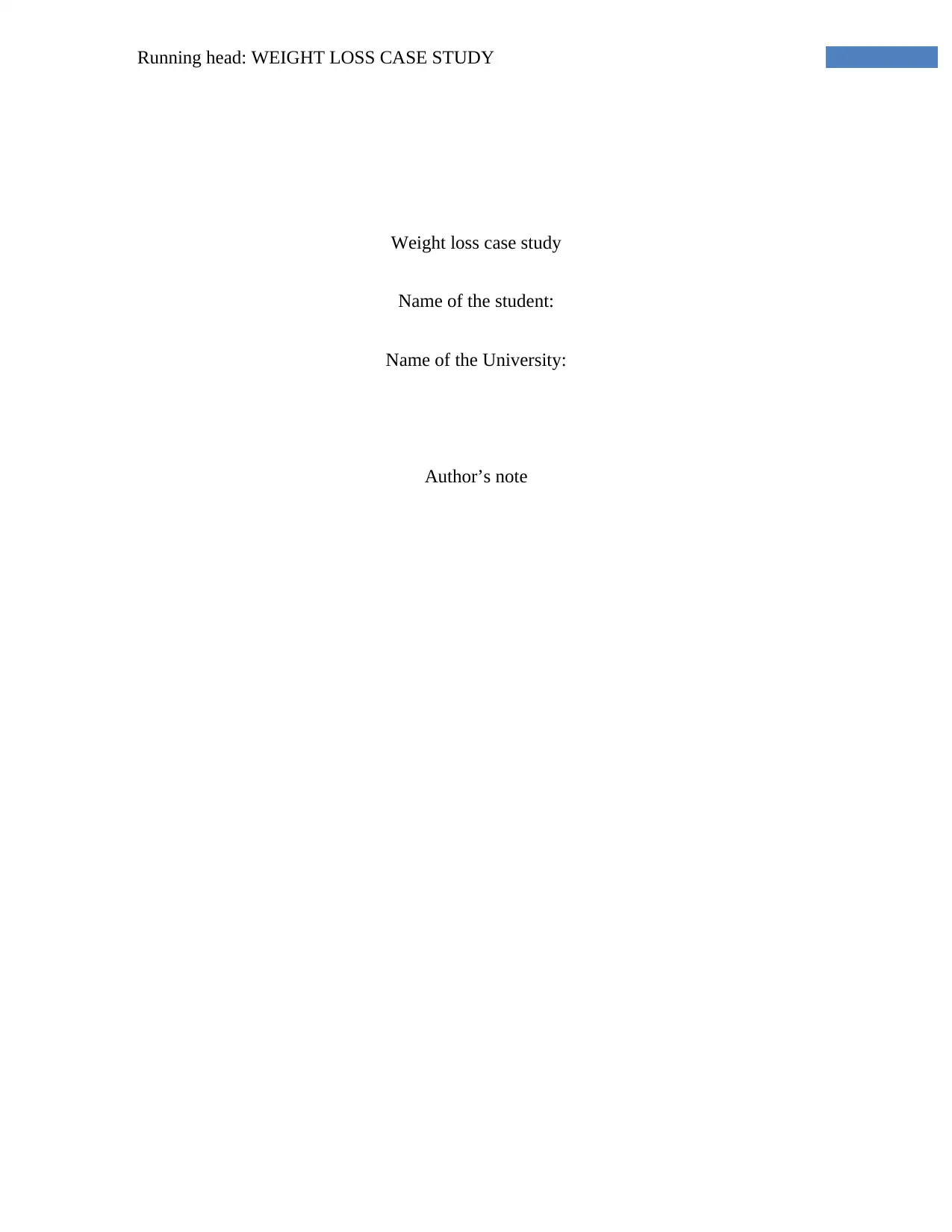
Running head: WEIGHT LOSS CASE STUDY
Weight loss case study
Name of the student:
Name of the University:
Author’s note
Weight loss case study
Name of the student:
Name of the University:
Author’s note
Paraphrase This Document
Need a fresh take? Get an instant paraphrase of this document with our AI Paraphraser

1WEIGHT LOSS CASE STUDY
Answer 1:
Ms. A.P. is a patient who has been diagnosed with obesity. She also suffers from
hypothyroidism and has a history of monthly migraine headaches. The specific goals of
treatment for A.P are as follows:
Comprehensive lifestyle management of patient (diet modification, changes in
lifestyle and level of physical activity)
As client has BMI higher than 27 kg/m2, pharmacotherapy also needs to be
provided to patient to control weight
Educate patients regarding the long term benefits of lower body weight and
preventing further weight gain
Answer 2:
I would provide drug therapy of Lorcaserin HCl (Belviq) to Ms. A.P as this is a new drug
approved by FDA for weight loss. It is approved for those patients who have BMI of over
30kg/m2. Since, A.P. has BMI of 32.3 kg/m2, it is suitable for A.P. It has been found to increase
additional health parameters too such as blood pressure, glucose levels and serum lipid level
(Mahgerefteh et al., 2013). Hence, patient is likely to have reduced risk of metabolic disease too.
Answer 3:
The patient was prescribed phentermine ER/topiramate. The combination of phentermine and
topiramate is given to patient for weight loss and reducing cardio-metabolic risk to patient
(Sweeting et al., 2014). The main parameters for monitoring the success of the therapy include
the following:
Answer 1:
Ms. A.P. is a patient who has been diagnosed with obesity. She also suffers from
hypothyroidism and has a history of monthly migraine headaches. The specific goals of
treatment for A.P are as follows:
Comprehensive lifestyle management of patient (diet modification, changes in
lifestyle and level of physical activity)
As client has BMI higher than 27 kg/m2, pharmacotherapy also needs to be
provided to patient to control weight
Educate patients regarding the long term benefits of lower body weight and
preventing further weight gain
Answer 2:
I would provide drug therapy of Lorcaserin HCl (Belviq) to Ms. A.P as this is a new drug
approved by FDA for weight loss. It is approved for those patients who have BMI of over
30kg/m2. Since, A.P. has BMI of 32.3 kg/m2, it is suitable for A.P. It has been found to increase
additional health parameters too such as blood pressure, glucose levels and serum lipid level
(Mahgerefteh et al., 2013). Hence, patient is likely to have reduced risk of metabolic disease too.
Answer 3:
The patient was prescribed phentermine ER/topiramate. The combination of phentermine and
topiramate is given to patient for weight loss and reducing cardio-metabolic risk to patient
(Sweeting et al., 2014). The main parameters for monitoring the success of the therapy include
the following:

2WEIGHT LOSS CASE STUDY
Patients should be monitored for the side effects of the drug such as dizziness, headache,
mood disorder, skin reaction, hepatotoxicity and palpitation
The use of this drug should be considered when patient is taking drugs like non-
potassium sparing diuretics, histamines, sedative, antipsychotics and analgesic.
The patient must be advised to immediately report to health care professional if they
experience changes in vision, concentration, memory and speech (Xiong & Gadde,
2014).
Answer 4
In case of giving phentermine ER/topiramate medication to Ms. A.P., she need to be given
the following education before prescribing the drug:
The patient must be educated regarding the side effects of drug such as risk of developing
kidney stones, dizziness, constipation, skin reaction, hepatotoxicity and palpitation
The patient must be made aware about some serious side effect of the drug such as
difficulty in concentration, memory problem, high breathing rate and signs of kidney
stones such as painful urination or bloody urine. Patient must be encourage to
immediately report to physician when she observed all these signs after taking the
medication
Patient must be advised not to do any activity requiring alertness immediately after taking
the medication (Xiong & Gadde, 2014).
As the medication is teratogenic, the patient must be educated regarding the harmful
impact of the drug in pregnant women and encouraging patient to report if she is pregnant
(Hernández-Díaz et al., 2014).
Patients should be monitored for the side effects of the drug such as dizziness, headache,
mood disorder, skin reaction, hepatotoxicity and palpitation
The use of this drug should be considered when patient is taking drugs like non-
potassium sparing diuretics, histamines, sedative, antipsychotics and analgesic.
The patient must be advised to immediately report to health care professional if they
experience changes in vision, concentration, memory and speech (Xiong & Gadde,
2014).
Answer 4
In case of giving phentermine ER/topiramate medication to Ms. A.P., she need to be given
the following education before prescribing the drug:
The patient must be educated regarding the side effects of drug such as risk of developing
kidney stones, dizziness, constipation, skin reaction, hepatotoxicity and palpitation
The patient must be made aware about some serious side effect of the drug such as
difficulty in concentration, memory problem, high breathing rate and signs of kidney
stones such as painful urination or bloody urine. Patient must be encourage to
immediately report to physician when she observed all these signs after taking the
medication
Patient must be advised not to do any activity requiring alertness immediately after taking
the medication (Xiong & Gadde, 2014).
As the medication is teratogenic, the patient must be educated regarding the harmful
impact of the drug in pregnant women and encouraging patient to report if she is pregnant
(Hernández-Díaz et al., 2014).
⊘ This is a preview!⊘
Do you want full access?
Subscribe today to unlock all pages.

Trusted by 1+ million students worldwide
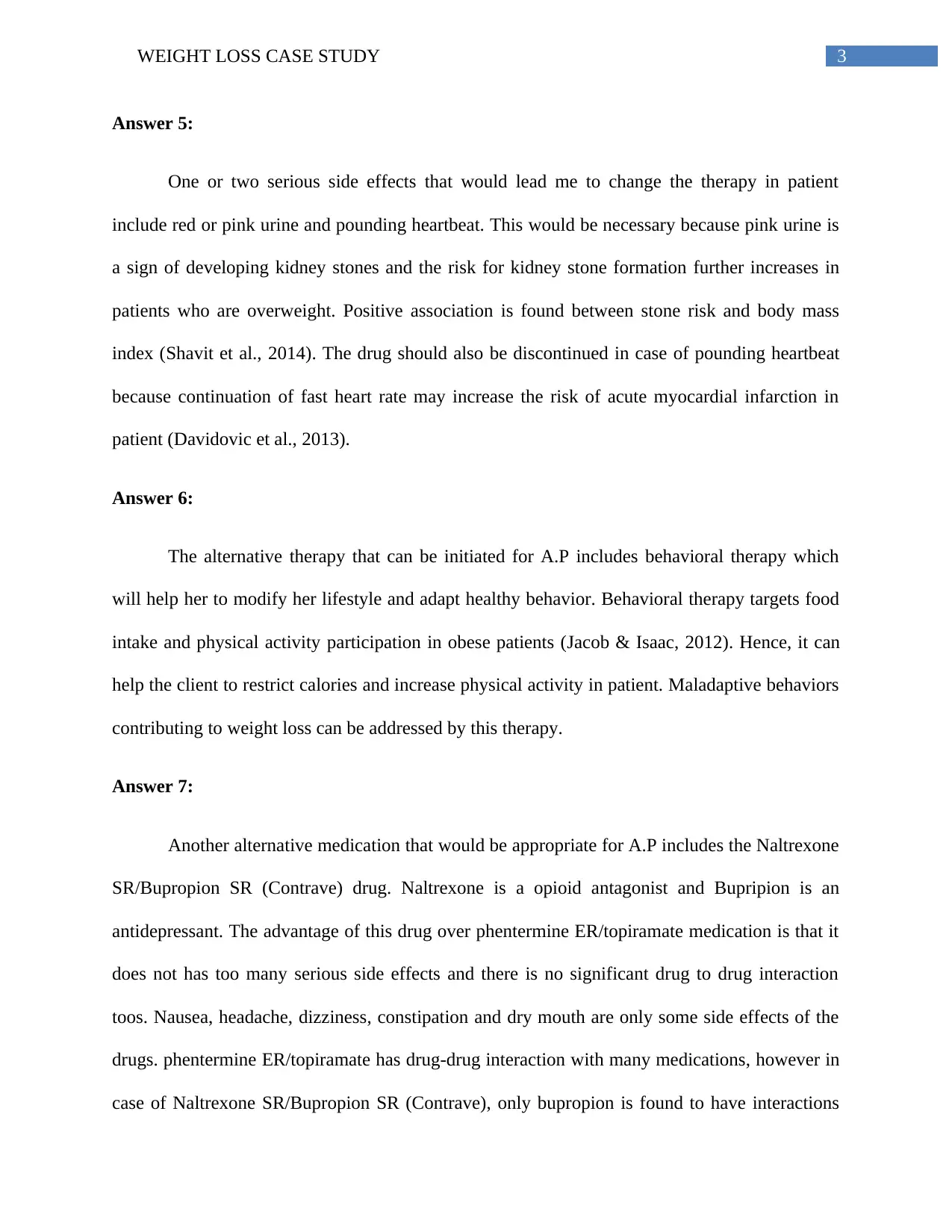
3WEIGHT LOSS CASE STUDY
Answer 5:
One or two serious side effects that would lead me to change the therapy in patient
include red or pink urine and pounding heartbeat. This would be necessary because pink urine is
a sign of developing kidney stones and the risk for kidney stone formation further increases in
patients who are overweight. Positive association is found between stone risk and body mass
index (Shavit et al., 2014). The drug should also be discontinued in case of pounding heartbeat
because continuation of fast heart rate may increase the risk of acute myocardial infarction in
patient (Davidovic et al., 2013).
Answer 6:
The alternative therapy that can be initiated for A.P includes behavioral therapy which
will help her to modify her lifestyle and adapt healthy behavior. Behavioral therapy targets food
intake and physical activity participation in obese patients (Jacob & Isaac, 2012). Hence, it can
help the client to restrict calories and increase physical activity in patient. Maladaptive behaviors
contributing to weight loss can be addressed by this therapy.
Answer 7:
Another alternative medication that would be appropriate for A.P includes the Naltrexone
SR/Bupropion SR (Contrave) drug. Naltrexone is a opioid antagonist and Bupripion is an
antidepressant. The advantage of this drug over phentermine ER/topiramate medication is that it
does not has too many serious side effects and there is no significant drug to drug interaction
toos. Nausea, headache, dizziness, constipation and dry mouth are only some side effects of the
drugs. phentermine ER/topiramate has drug-drug interaction with many medications, however in
case of Naltrexone SR/Bupropion SR (Contrave), only bupropion is found to have interactions
Answer 5:
One or two serious side effects that would lead me to change the therapy in patient
include red or pink urine and pounding heartbeat. This would be necessary because pink urine is
a sign of developing kidney stones and the risk for kidney stone formation further increases in
patients who are overweight. Positive association is found between stone risk and body mass
index (Shavit et al., 2014). The drug should also be discontinued in case of pounding heartbeat
because continuation of fast heart rate may increase the risk of acute myocardial infarction in
patient (Davidovic et al., 2013).
Answer 6:
The alternative therapy that can be initiated for A.P includes behavioral therapy which
will help her to modify her lifestyle and adapt healthy behavior. Behavioral therapy targets food
intake and physical activity participation in obese patients (Jacob & Isaac, 2012). Hence, it can
help the client to restrict calories and increase physical activity in patient. Maladaptive behaviors
contributing to weight loss can be addressed by this therapy.
Answer 7:
Another alternative medication that would be appropriate for A.P includes the Naltrexone
SR/Bupropion SR (Contrave) drug. Naltrexone is a opioid antagonist and Bupripion is an
antidepressant. The advantage of this drug over phentermine ER/topiramate medication is that it
does not has too many serious side effects and there is no significant drug to drug interaction
toos. Nausea, headache, dizziness, constipation and dry mouth are only some side effects of the
drugs. phentermine ER/topiramate has drug-drug interaction with many medications, however in
case of Naltrexone SR/Bupropion SR (Contrave), only bupropion is found to have interactions
Paraphrase This Document
Need a fresh take? Get an instant paraphrase of this document with our AI Paraphraser
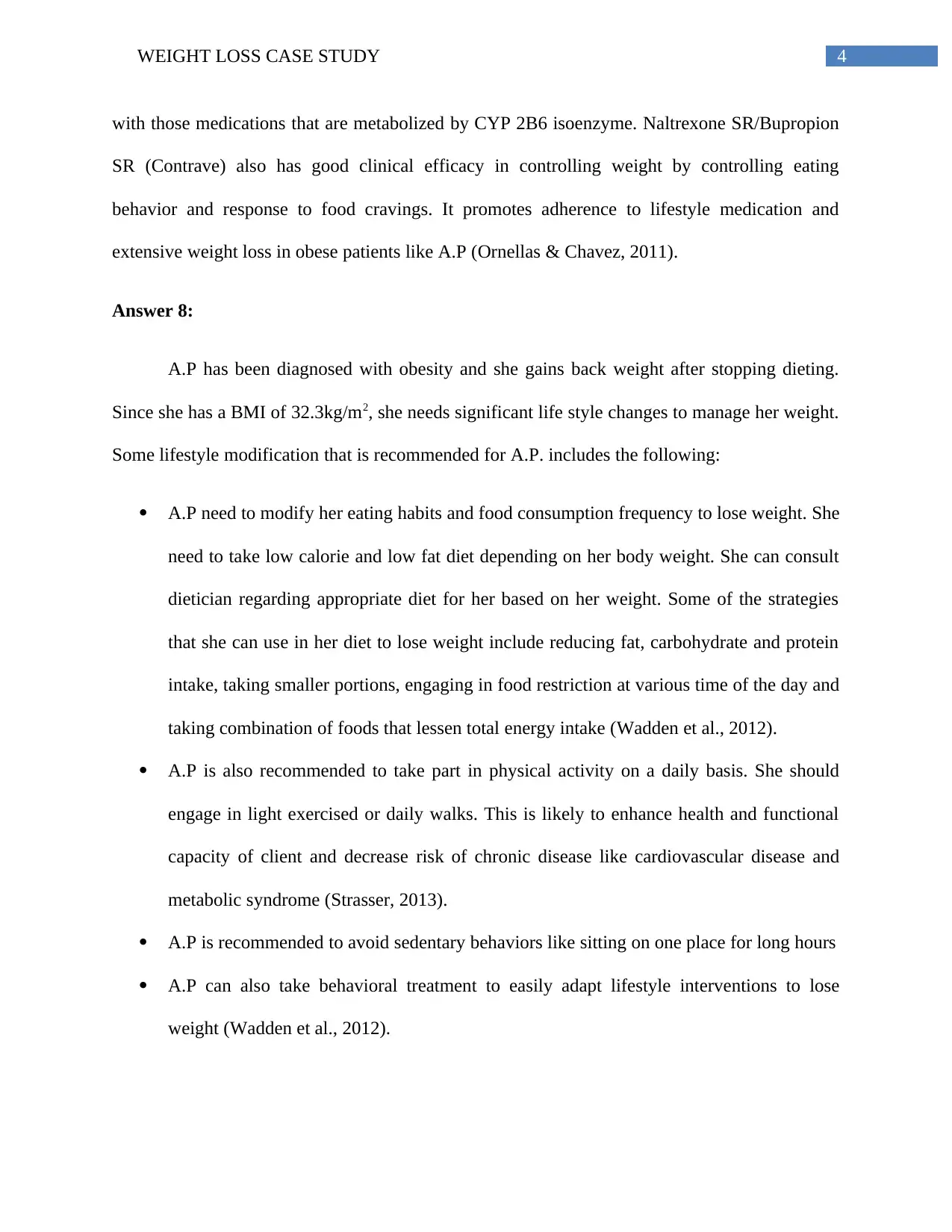
4WEIGHT LOSS CASE STUDY
with those medications that are metabolized by CYP 2B6 isoenzyme. Naltrexone SR/Bupropion
SR (Contrave) also has good clinical efficacy in controlling weight by controlling eating
behavior and response to food cravings. It promotes adherence to lifestyle medication and
extensive weight loss in obese patients like A.P (Ornellas & Chavez, 2011).
Answer 8:
A.P has been diagnosed with obesity and she gains back weight after stopping dieting.
Since she has a BMI of 32.3kg/m2, she needs significant life style changes to manage her weight.
Some lifestyle modification that is recommended for A.P. includes the following:
A.P need to modify her eating habits and food consumption frequency to lose weight. She
need to take low calorie and low fat diet depending on her body weight. She can consult
dietician regarding appropriate diet for her based on her weight. Some of the strategies
that she can use in her diet to lose weight include reducing fat, carbohydrate and protein
intake, taking smaller portions, engaging in food restriction at various time of the day and
taking combination of foods that lessen total energy intake (Wadden et al., 2012).
A.P is also recommended to take part in physical activity on a daily basis. She should
engage in light exercised or daily walks. This is likely to enhance health and functional
capacity of client and decrease risk of chronic disease like cardiovascular disease and
metabolic syndrome (Strasser, 2013).
A.P is recommended to avoid sedentary behaviors like sitting on one place for long hours
A.P can also take behavioral treatment to easily adapt lifestyle interventions to lose
weight (Wadden et al., 2012).
with those medications that are metabolized by CYP 2B6 isoenzyme. Naltrexone SR/Bupropion
SR (Contrave) also has good clinical efficacy in controlling weight by controlling eating
behavior and response to food cravings. It promotes adherence to lifestyle medication and
extensive weight loss in obese patients like A.P (Ornellas & Chavez, 2011).
Answer 8:
A.P has been diagnosed with obesity and she gains back weight after stopping dieting.
Since she has a BMI of 32.3kg/m2, she needs significant life style changes to manage her weight.
Some lifestyle modification that is recommended for A.P. includes the following:
A.P need to modify her eating habits and food consumption frequency to lose weight. She
need to take low calorie and low fat diet depending on her body weight. She can consult
dietician regarding appropriate diet for her based on her weight. Some of the strategies
that she can use in her diet to lose weight include reducing fat, carbohydrate and protein
intake, taking smaller portions, engaging in food restriction at various time of the day and
taking combination of foods that lessen total energy intake (Wadden et al., 2012).
A.P is also recommended to take part in physical activity on a daily basis. She should
engage in light exercised or daily walks. This is likely to enhance health and functional
capacity of client and decrease risk of chronic disease like cardiovascular disease and
metabolic syndrome (Strasser, 2013).
A.P is recommended to avoid sedentary behaviors like sitting on one place for long hours
A.P can also take behavioral treatment to easily adapt lifestyle interventions to lose
weight (Wadden et al., 2012).
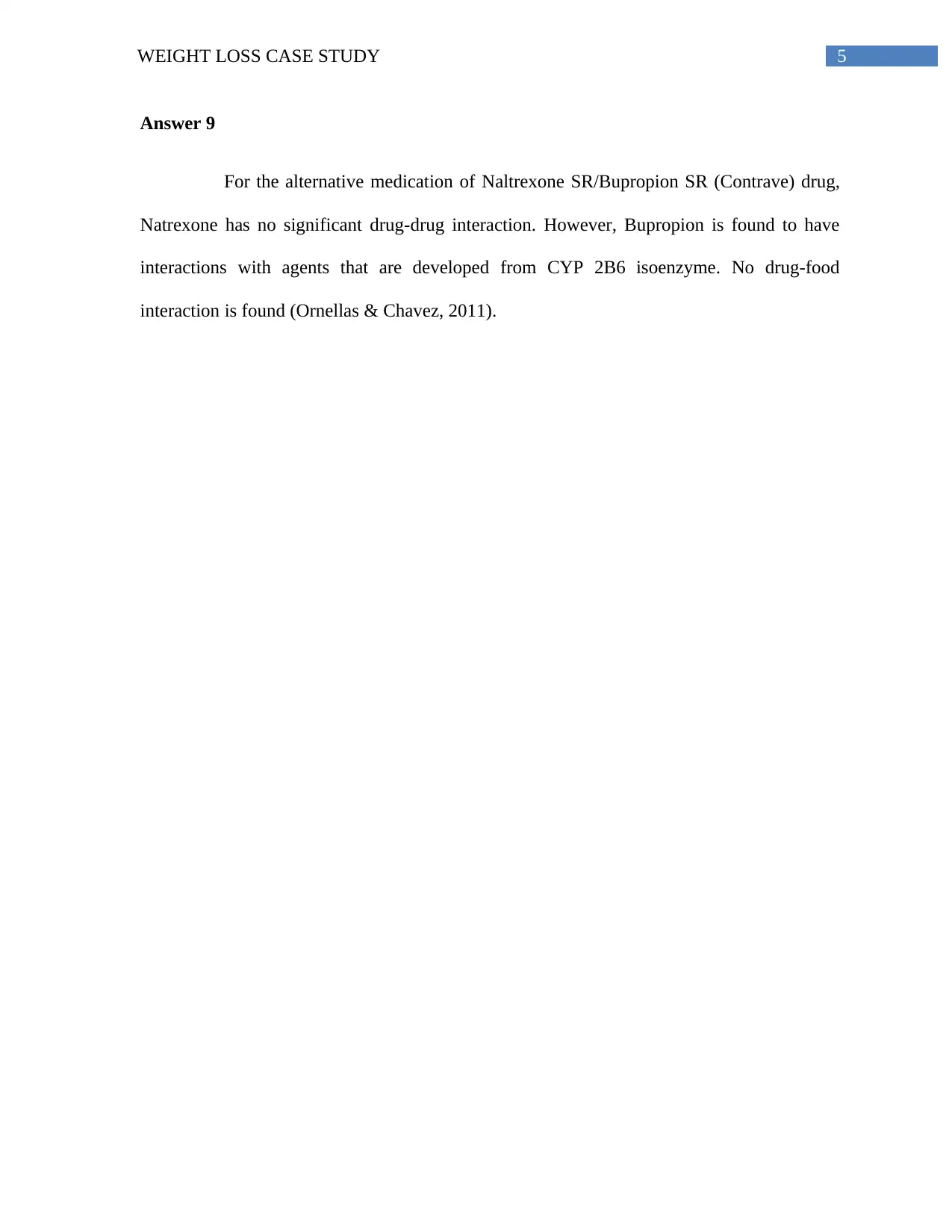
5WEIGHT LOSS CASE STUDY
Answer 9
For the alternative medication of Naltrexone SR/Bupropion SR (Contrave) drug,
Natrexone has no significant drug-drug interaction. However, Bupropion is found to have
interactions with agents that are developed from CYP 2B6 isoenzyme. No drug-food
interaction is found (Ornellas & Chavez, 2011).
Answer 9
For the alternative medication of Naltrexone SR/Bupropion SR (Contrave) drug,
Natrexone has no significant drug-drug interaction. However, Bupropion is found to have
interactions with agents that are developed from CYP 2B6 isoenzyme. No drug-food
interaction is found (Ornellas & Chavez, 2011).
⊘ This is a preview!⊘
Do you want full access?
Subscribe today to unlock all pages.

Trusted by 1+ million students worldwide

6WEIGHT LOSS CASE STUDY
Reference:
Davidovic, G., Iric-Cupic, V., Milanov, S., Dimitijevic, A., & Petrovic-Janicijevic, M. (2013).
When heart goes “BOOM” to fast. Heart rate greater than 80 as mortality predictor in
acute myocardial infarction. American journal of cardiovascular disease, 3(3), 120.
Hernández-Díaz, S., Mittendorf, R., Smith, C. R., Hauser, W. A., Yerby, M., & Holmes, L. B.
(2014). Association between topiramate and zonisamide use during pregnancy and low
birth weight. Obstetrics & Gynecology, 123(1), 21-28.
Jacob, J. J., & Isaac, R. (2012). Behavioral therapy for management of obesity. Indian journal of
endocrinology and metabolism, 16(1), 28.
Mahgerefteh, B., Vigue, M., Freestone, Z., Silver, S., & Nguyen, Q. (2013). New drug therapies
for the treatment of overweight and obese patients. American health & drug
benefits, 6(7), 423.
Ornellas, T., & Chavez, B. (2011). Naltrexone SR/Bupropion SR (Contrave): a new approach to
weight loss in obese adults. Pharmacy and Therapeutics, 36(5), 255.
Shavit, L., Ferraro, P. M., Johri, N., Robertson, W., Walsh, S. B., Moochhala, S., & Unwin, R.
(2014). Effect of being overweight on urinary metabolic risk factors for kidney stone
formation. Nephrology Dialysis Transplantation, 30(4), 607-613.
Strasser, B. (2013). Physical activity in obesity and metabolic syndrome. Annals of the New York
Academy of Sciences, 1281(1), 141-159.
Reference:
Davidovic, G., Iric-Cupic, V., Milanov, S., Dimitijevic, A., & Petrovic-Janicijevic, M. (2013).
When heart goes “BOOM” to fast. Heart rate greater than 80 as mortality predictor in
acute myocardial infarction. American journal of cardiovascular disease, 3(3), 120.
Hernández-Díaz, S., Mittendorf, R., Smith, C. R., Hauser, W. A., Yerby, M., & Holmes, L. B.
(2014). Association between topiramate and zonisamide use during pregnancy and low
birth weight. Obstetrics & Gynecology, 123(1), 21-28.
Jacob, J. J., & Isaac, R. (2012). Behavioral therapy for management of obesity. Indian journal of
endocrinology and metabolism, 16(1), 28.
Mahgerefteh, B., Vigue, M., Freestone, Z., Silver, S., & Nguyen, Q. (2013). New drug therapies
for the treatment of overweight and obese patients. American health & drug
benefits, 6(7), 423.
Ornellas, T., & Chavez, B. (2011). Naltrexone SR/Bupropion SR (Contrave): a new approach to
weight loss in obese adults. Pharmacy and Therapeutics, 36(5), 255.
Shavit, L., Ferraro, P. M., Johri, N., Robertson, W., Walsh, S. B., Moochhala, S., & Unwin, R.
(2014). Effect of being overweight on urinary metabolic risk factors for kidney stone
formation. Nephrology Dialysis Transplantation, 30(4), 607-613.
Strasser, B. (2013). Physical activity in obesity and metabolic syndrome. Annals of the New York
Academy of Sciences, 1281(1), 141-159.
Paraphrase This Document
Need a fresh take? Get an instant paraphrase of this document with our AI Paraphraser
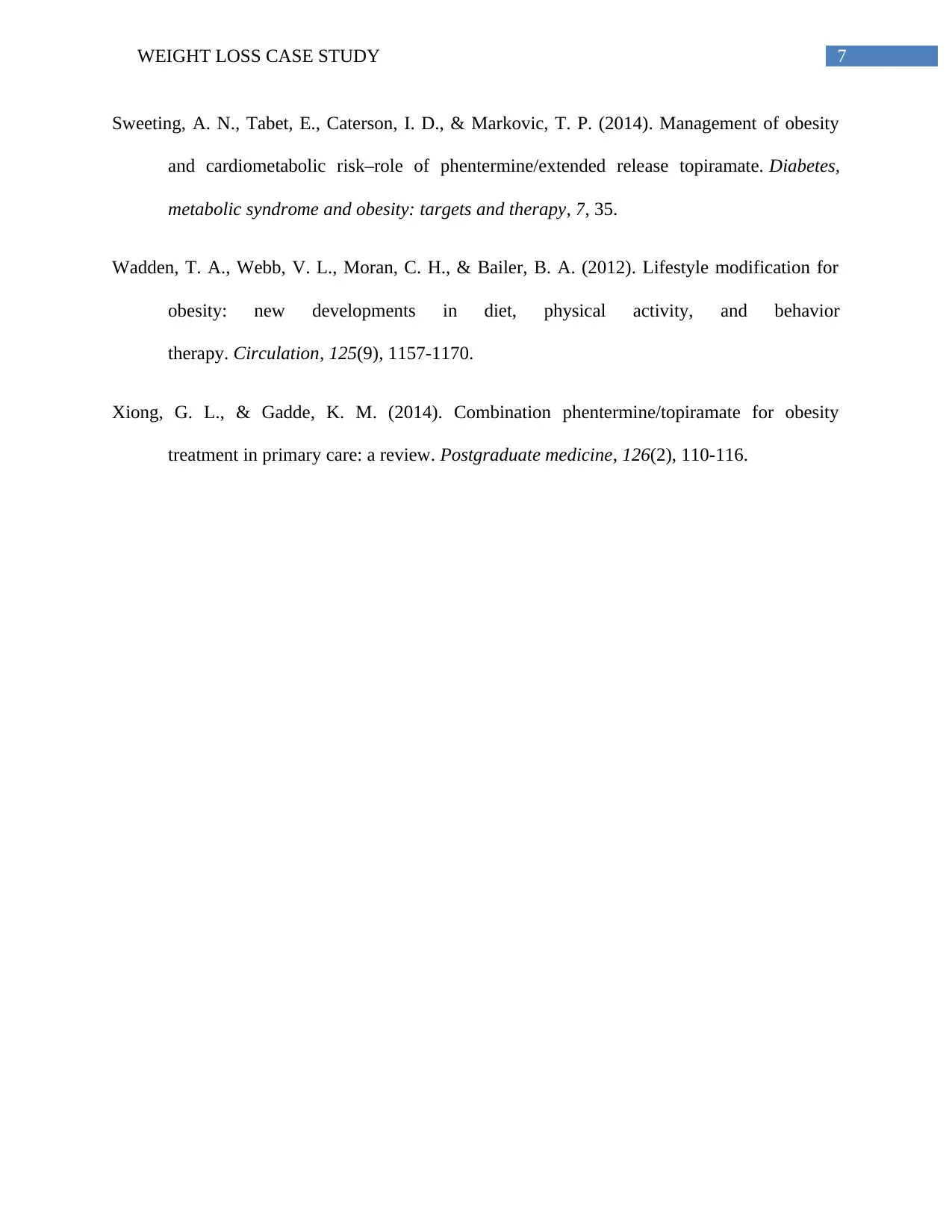
7WEIGHT LOSS CASE STUDY
Sweeting, A. N., Tabet, E., Caterson, I. D., & Markovic, T. P. (2014). Management of obesity
and cardiometabolic risk–role of phentermine/extended release topiramate. Diabetes,
metabolic syndrome and obesity: targets and therapy, 7, 35.
Wadden, T. A., Webb, V. L., Moran, C. H., & Bailer, B. A. (2012). Lifestyle modification for
obesity: new developments in diet, physical activity, and behavior
therapy. Circulation, 125(9), 1157-1170.
Xiong, G. L., & Gadde, K. M. (2014). Combination phentermine/topiramate for obesity
treatment in primary care: a review. Postgraduate medicine, 126(2), 110-116.
Sweeting, A. N., Tabet, E., Caterson, I. D., & Markovic, T. P. (2014). Management of obesity
and cardiometabolic risk–role of phentermine/extended release topiramate. Diabetes,
metabolic syndrome and obesity: targets and therapy, 7, 35.
Wadden, T. A., Webb, V. L., Moran, C. H., & Bailer, B. A. (2012). Lifestyle modification for
obesity: new developments in diet, physical activity, and behavior
therapy. Circulation, 125(9), 1157-1170.
Xiong, G. L., & Gadde, K. M. (2014). Combination phentermine/topiramate for obesity
treatment in primary care: a review. Postgraduate medicine, 126(2), 110-116.
1 out of 8
Your All-in-One AI-Powered Toolkit for Academic Success.
+13062052269
info@desklib.com
Available 24*7 on WhatsApp / Email
![[object Object]](/_next/static/media/star-bottom.7253800d.svg)
Unlock your academic potential
Copyright © 2020–2026 A2Z Services. All Rights Reserved. Developed and managed by ZUCOL.

